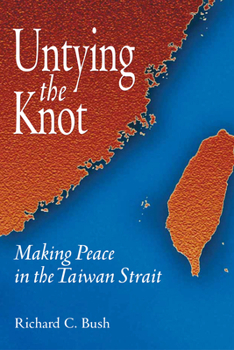Untying the Knot: Making Peace in the Taiwan Strait
Select Format
Select Condition 
Book Overview
" The relationship between Taiwan and China is a paradox. On the one hand, the two economies are becoming increasingly integrated, as Taiwanese companies have come to regard the mainland as the best place to manufacture their products and maintain global competitiveness. On the other hand, the long-running and changing political dispute between the two governments remains unresolved. Each side fears the intentions of the other and is acquiring military...
Format:Paperback
Language:English
ISBN:0815712901
ISBN13:9780815712909
Release Date:August 2006
Publisher:Brookings Institution Press
Length:432 Pages
Weight:1.40 lbs.
Dimensions:1.2" x 6.0" x 9.1"
Customer Reviews
2 ratings
Excellent Primer on a Complex Geopolitical Issue
Published by Thriftbooks.com User , 16 years ago
I would strongly recommend this excellent book for anyone who seriously wants to read about one of the most complex geopolitical issues affecting security in Asia and Sino-US relations. Mr. Bush served as head of the American Institute in Taiwan ("AIT"), the organization established by Congress in the 1970s to handle relations between the US and the ROC authorities controlling Taiwan after the US switched formal diplomatic recognition to the PRC. As a part of his duties, Mr. Bush repeatedly met with the highest members of the political establishment in Taiwan as well as with the most senior US policy makers under the Clinton and Bush (II) administrations. Mr. Bush's book provides the reader with a very readable, detailed and accurate description of the historic background and current political dilemmas raised by the current division of authority on each side of the Taiwan Strait. He dispassionately and accurately summarizes the various geographical, historic, political, economic, legal, cultural, linguistic and social factors impacting and shaping the acrimonious relations between the authorities in the Beijing and Taipei. His description of those complex issues and their interactions within the context of cross strait relations is one of the most objective and clear-sighted descriptions I've yet read. Mr. Bush also deftly analyses the role of the US government within the context of cross strait relations and on Sino-US relations in general. In particular, Bush relies on solid facts as evidenced by the excellent citations to varied sources, including open source press materials, observations of leading political figures with whom he has personally met, various treatises and policy papers by Chinese, Taiwanese and US analysts. Moreover, and despite another reviewer's rather silly comments to the contrary, Bush's grasp of the public international law issues is quite good and based on his professional experience and extensive interaction with public international legal specialists, both inside and outside of the United States government. Bush's description of these legal issues further illustrates the complexities dogging the resolution of this complex issue. While I may not entirely agree with all of his conclusions on the role the US can play in bringing about a resolution to the issue of reunification, I found this work to be a worthy addition to the limited corpus of works on this critical issue. I should add that I was an official with the AIT from 1998-2000 though I never met Mr. Bush in person. Before that I spent several years in Asia working for the US government, both as military officer and later as diplomat. I've traveled extensively in China, and have many Chinese and Taiwanese friends, in and out of their respective governments, with whom I've discussed the issues related to cross strait relations. In short, I've been intimately involved with cross strait relations and Sino-US relations for some time and strongly bel
Good choices going forward!
Published by Thriftbooks.com User , 18 years ago
The author did a good job explaining the history of the 56-year conflict of the two sides. From 1991 to 2004, Taiwan invested a total of $78 billion USDollars in China and cross-strait trade was about the same amount. With no suicide bomber or mass murders of Taiwan investors, the two sides are still at odds with the political deadlock. Issues on sovereignty, security, independence vs unification, the leverage game, US factor.. were covered in depth. People in Taiwan followed the Japanese and US business model, the economy boomed for 40 years. Now that the middle class in China is doing the same thing, that is about 100 million out of 1.3 billion people. Again, the two sides are very different. Untying the knot will be at least 20+ years when the majority of 1.3 billion are catching up as middle class in China.





